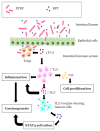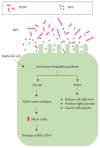The Mechanism of Bacteroides fragilis Toxin Contributes to Colon Cancer Formation
- PMID: 32863742
- PMCID: PMC7444842
- DOI: 10.21315/mjms2020.27.4.2
The Mechanism of Bacteroides fragilis Toxin Contributes to Colon Cancer Formation
Abstract
The Bacteroides fragilis (B. fragilis) produce biofilm for colonisation in the intestinal tract can cause a series of inflammatory reactions due to B. fragilis toxin (BFT) which can lead to chronic intestinal inflammation and tissue injury and play a crucial role leading to colorectal cancer (CRC). The enterotoxigenic B. fragilis (ETBF) forms biofilm and produce toxin and play a role in CRC, whereas the non-toxigenic B. fragilis (NTBF) does not produce toxin. The ETBF triggers the expression of cyclooxygenase (COX)-2 that releases PGE2 for inducing inflammation and control cell proliferation. From chronic intestinal inflammation to cancer development, it involves signal transducers and activators of transcription (STAT)3 activation. STAT3 activates by the interaction between epithelial cells and BFT. Thus, regulatory T-cell (Tregs) will activates and reduce interleukin (IL)-2 amount. As the level of IL-2 drops, T-helper (Th17) cells are generated leading to increase in IL-17 levels. IL-17 is implicated in early intestinal inflammation and promotes cancer cell survival and proliferation and consequently triggers IL-6 production that activate STAT3 pathway. Additionally, BFT degrades E-cadherin, hence alteration of signalling pathways can upregulate spermine oxidase leading to cell morphology and promote carcinogenesis and irreversible DNA damage. Patient with familial adenomatous polyposis (FAP) disease displays a high level of tumour load in the colon. This disease is caused by germline mutation of the adenomatous polyposis coli (APC) gene that increases bacterial adherence to the mucosa layer. Mutated-APC gene genotype with ETBF increases the chances of CRC development. Therefore, the colonisation of the ETBF in the intestinal tract depicts tumour aetiology can result in risk of hostility and effect on human health.
Keywords: Bacteroides fragilis; Bacteroides fragilis toxin; STAT3 pathway; colon cancer; inflammation.
© Penerbit Universiti Sains Malaysia, 2020.
Conflict of interest statement
Conflict of Interest None.
Figures




References
-
- Snezhkina AV, Krasnov GS, Lipatova AV, Sadritdinova AF, Kardymon OL, Fedorova MS, et al. The dysregulation of polyamine metabolism in colorectal cancer is associated with overexpression of c-Myc and C/EBPβ rather than enterotoxigenic Bacteroides fragilis infection. Oxid Med Cell Longev. 2016;2016:1–11. doi: 10.1155/2016/2353560. - DOI - PMC - PubMed
Publication types
LinkOut - more resources
Full Text Sources
Other Literature Sources
Research Materials
Miscellaneous
